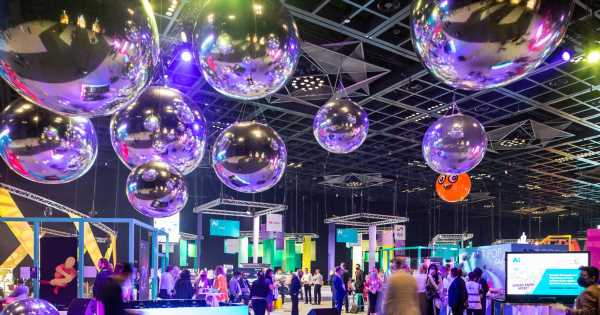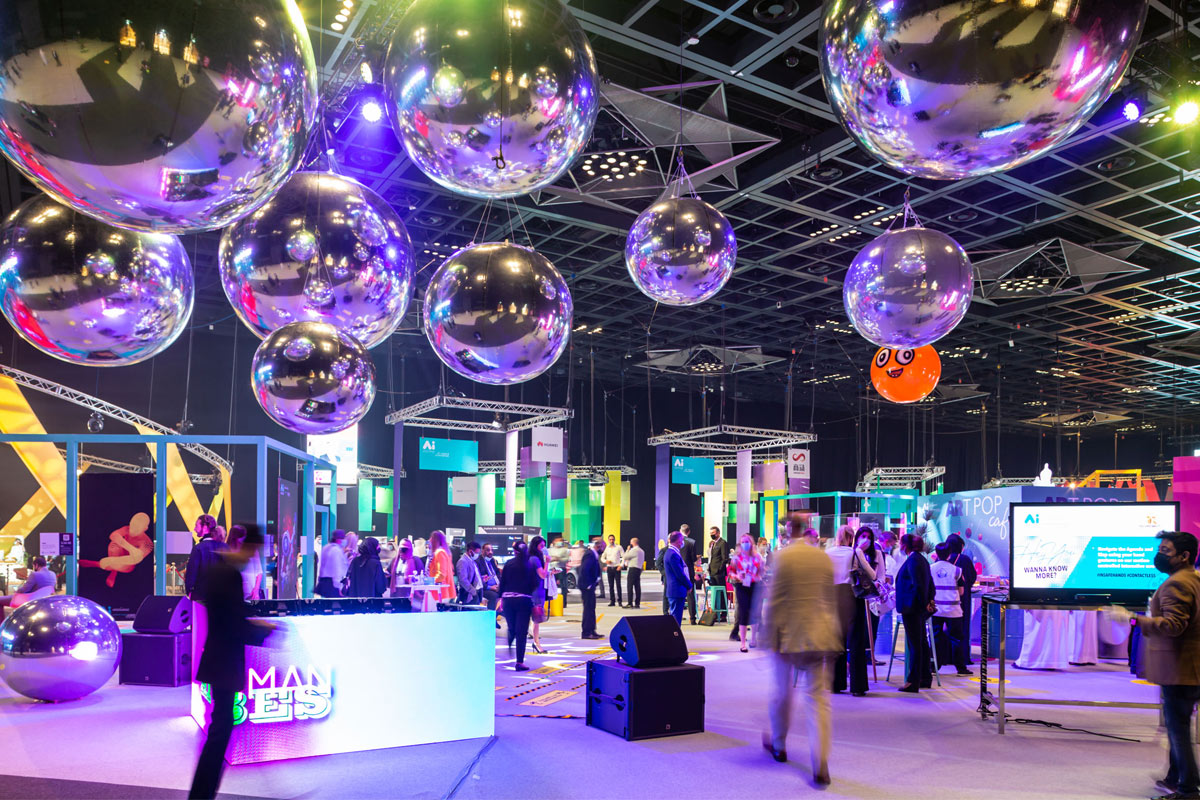While digitisation and virtual events served as a lifeline for the events industry during the pandemic, industry experts believe that in-person events will prevail post-pandemic
Dubai has proven to the world that it can safely and responsibly host in-person events following the effects of the pandemic.
Following the resumption of international tourism in Dubai last year, the city has continued to witness a healthy pipeline of conferences and events. With Expo 2020 Dubai opening its doors to the world this week, it presents yet another opportunity for Dubai to cement its position as a leader in hosting large-scale, in-person events.
“I believe Dubai has shown the pathway for the world to follow, along with the UAE in general, as to how to get back on track, restoring some semblance of normalcy to our lives as a whole, but specifically to the events industry,” shared Harmeek Singh, chairman and founder of Plan B, a UAE-based event and activation agency.
From boutique event agencies to industry giants, the pandemic has prompted the events sector to rethink its traditional offerings and find ways to better utilise its digital capabilities.
“DWTC was the first venue in the region to take steps in re-hosting large scale events following the pandemic,” shared Mahir Julfar, executive vice president of venue services management at DWTC.
“GITEX Technology Week was the only major technology event in the world to go live in 2020… DWTC ensured that it was ahead of the curve, using technology to deliver a safe and responsibly hosted event which delivered contactless registration and minimised physical interaction, while the rest of the industry was still hosting events virtually.”
 Mahir Julfar, executive vice president of venue services management at DWTC.
Mahir Julfar, executive vice president of venue services management at DWTC.
Driven by the UAE’s strong vaccine push, easing travel restrictions, and major events such as Expo, Dubai’s events industry remains a vital pillar for supporting business tourism and strengthening its position as a leading events destination in the region.
“The Meetings, Incentives, Conferences and Exhibitions (MICE) sector supports Dubai and the UAE’s diversification and sustainable growth agenda and its success largely supports wider industries,” said Julfar.
Future of events
While technology and digitisation were key to creating immersive experiences for audiences during a time tainted by global lockdowns, Julfar believes that in-person events will dominate post-pandemic.
“In-person interaction is essential in driving business opportunities and in sparking innovation, and the future of events will undoubtedly be in-person due to this reality. Dubai has proven to the world that it can safely and responsibly host in-person events following the effects of the pandemic.”
DWTC’s key findings from GITEX Technology Week 2020 and Gulfood 2021 indicated a global desire and appetite for doing business in a face-to-face environment, with Dubai scoring high in key safety and satisfaction ratings.
 DWTC’s key findings from GITEX Technology Week 2020 and Gulfood 2021.
DWTC’s key findings from GITEX Technology Week 2020 and Gulfood 2021.
Findings stated that 98 percent of attendees consistently rated these events as providing a safe or very safe experience, 40 percent of international attendees decided to attend the events regardless of quarantine requirements, and 41 percent of international travellers extended their stay after the event, of which 85 percent did so for business related purposes.
“While elements of hybrid and virtual events served a short-term purpose to ensure that networking remained possible through the pandemic, the overwhelming feedback DWTC have received from our exhibitors and visitors is that they want to attend and participate in physical, in-person events.”
With that, DWTC is set to host over 40 trade events from September to December of this year, representing a very promising outlook for the industry with the return of large trade exhibitions and events.
Singh also believes that the sector is set to experience a new phase of growth, not just locally but also regionally, with innovation being the key driver.
“Taking the lead in sustainability and creativity, combined with the appropriate use of technology, we can see a lot of potential for innovation in the kind of events that we will see in Dubai that will become a global benchmark for the rest of the world to emulate.”
 Harmeek Singh, chairman and founder of Plan B.
Harmeek Singh, chairman and founder of Plan B.
“The pandemic forced everyone to immediately adapt, and, in most cases, innovate. It’s so important to be agile, and, where possible, to think outside the box in order to keep your clients and key stakeholders engaged,” added Julfar.
A wakeup call for the sector
While the events sector is well on its way to achieving a full recovery, industry experts believe that the unprecedented pandemic was the wakeup call needed to help revolutionise and rejuvenate the industry for the long term.
“I believe there are certain norms and protocols that need to be established, not just for when a similar situation happens in the future but also in terms of giving the industry a boost as a whole,” said Singh.
“Based on a survey that we did of about 300 companies, our industry lost anywhere from AED2.8billion ($762.3 million) to AED5.5bn ($1.5bn) at the height of the pandemic, so post-Covid the events industry will adopt a more responsible and sustainable model where everyone can co-exist in an ecosystem that could potentially benefit everyone.”
On the importance of engaging with industry players, Singh expresses the necessity of establishing a platform or set of standards that will encourage healthy competition and professionalise the industry even further.
 DWTC is set to host over 40 trade events from September to December of this year.
DWTC is set to host over 40 trade events from September to December of this year.
“I would recommend having a government entity being established for the industry in which we can adopt a certification model where event providers can commit to certain standards and are given ratings for the level or quality of service that they provide.”
“This will bring about better competition that can only be good for the market overall moving forward to ensure that industry not only survives but achieves sustainable growth in the future,” he added.
Collaborative effort
In Dubai, the events sector works hand-in-hand with the airline, hospitality, retail, and F&B industries to elevate the participants’ experience, with the monetary value of this collaboration representing a key slice of the overall GDP.
“With various sectors working together, people can now safely participate and attend events that have become an essential part of living in Dubai,” said Singh.
“Events are the soul and essence of Dubai’s position as a global tourism and business hub. It is here where businesses come and are made, with many international conferences and trade events contributing a great deal of economic activity that will has made Dubai such a fantastic place for living and doing business in.”
 Events are the soul and essence of Dubai’s position as a global tourism and business hub.
Events are the soul and essence of Dubai’s position as a global tourism and business hub.
According to Dubai’s Department of Tourism and Commerce Marketing (DTCM), conferences and events accounted for 3 percent of Dubai’s AED112bn ($30.5bn) economy in 2019, generating about $3.3bn for the emirate’s coffers.
“This tells the importance of the events industry as it provides residual income for other businesses such as hotels, restaurants, transport companies and more.”
On the sector’s contribution to employment generation, Singh referred to a survey that indicates that one major event employs about 440 people.
“Over the next few years, we estimate 500,000 new jobs will be created in the exhibition industry within the larger events sector and that new venues will be created to accommodate a growing number and variety of events that will be taking place in the future,” he added.
Source: Read Full Article


 Mahir Julfar, executive vice president of venue services management at DWTC.
Mahir Julfar, executive vice president of venue services management at DWTC. DWTC’s key findings from GITEX Technology Week 2020 and Gulfood 2021.
DWTC’s key findings from GITEX Technology Week 2020 and Gulfood 2021. Harmeek Singh, chairman and founder of Plan B.
Harmeek Singh, chairman and founder of Plan B. DWTC is set to host over 40 trade events from September to December of this year.
DWTC is set to host over 40 trade events from September to December of this year. Events are the soul and essence of Dubai’s position as a global tourism and business hub.
Events are the soul and essence of Dubai’s position as a global tourism and business hub.